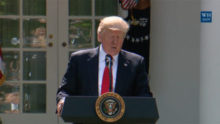Trump’s withdrawal from the Paris Agreement: what next for international climate policy?

[This piece was originally published on the International Affairs Blog, the online forum of the Chatham House journal]
On 1 June 2017, US President Trump stepped into the White House Rose Garden to announce that he would pull America out of the Paris Agreement on climate change. Trump reminded his audience that he was fulfilling a campaign pledge ‘to exit or renegotiate any deal which fails to serve America’s interest’ and declared: ‘I was elected to represent the citizens of Pittsburgh, not Paris.’ As Trump was still speaking, the mayor of Pittsburgh tweeted: ‘I can assure you that we will follow the guidelines of the Paris agreement for our people, our economy and our future.’ Within hours, Trump’s decision was universally condemned — by the leaders of other major emitters, by many of America’s largest corporations, and by 187 mayors and 10 governors from across the United States.
This is, of course, not the first time that a US president has pulled out of an internationally-agreed environmental treaty. After all, it was George W. Bush who in 2001 decided to withdraw the US signature from the Kyoto Protocol. Back then, as today, America’s unilateral move provoked outrage around the world, including in Beijing and Delhi. But the swiftness with which the world’s leading emitters of greenhouse gases (GHG) rallied behind the Paris accord signifies a shift in global attitudes. Chinese and Indian support for the Kyoto treaty was ‘cheap’ because the treaty exempted developing countries from global climate change mitigation. The situation is different under the Paris Agreement as all countries are committed to taking climate action. Paris has more global support than the Kyoto Protocol, which is why Trump’s unilateral decision to ditch Paris is likely to lead to a more significant loss in soft power that may be felt on issues far beyond climate change.
How damaging is Trump’s move to the Paris Agreement and international climate policy? And what can be done to contain the ‘Trump effect’?
The good news is that the Paris Agreement can survive US withdrawal. Trump’s announcement has, if anything, reinforced international support for the treaty. Because it is built on a decentralised system of voluntary mitigation pledges (see my analysis in International Affairs), the Paris accord is more resilient to political shocks than Kyoto. As long as other major emitters stick to their mitigation pledges (known as nationally determined contributions -NDCs), the Paris process of reviewing progress and renewing pledges will carry on as planned. In any case, the earliest that the US would actually leave the treaty is after the next presidential election in 2020, by which time the political climate in the US may have shifted again.
Still, Trump’s move threatens to undermine the Paris climate agenda. The US is changing course just as emerging economies have started to curb their fast-rising emissions and global carbon emissions have begun to level off despite continued growth in the global economy. What matters, therefore, is whether Trump’s rejection of Paris will encourage other recalcitrant powers to relax their own Paris pledges. US emissions had been declining for several years now, raising hopes that the country would meet its NDC (26–28% reduction in GHG emissions by 2025 compared to 2005). Now that Trump has ditched his predecessor’s climate agenda, the US is bound to miss this target. According to a recent analysis, the Trump Administration’s climate policies, if fully implemented and not compensated by other actors, would flatten US emissions. In a worst-case scenario, US emissions could even start rising again.
Much depends, therefore, on the extent to which subnational actors in the US can soften the impact of Trump’s climate policy reversal. The governors of California, New York and Washington have already announced that they will stick to the Paris pledges. Leading CEOs, including from Goldman Sachs, Unilever, The Coca Cola Company, Proctor & Gamble, and The Dow Chemical Company, have likewise declared their support for Paris. After years of investing in energy efficiency and green energy, corporate boardrooms in the US are unlikely to reverse course and embrace outdated fossil fuel energy solutions. As other major economies are increasingly betting on renewable energy and green technologies, leading US companies will want to avoid falling behind in the global race to build the low-carbon economy of the future.
The green energy revolution may be underway, but it still needs a helping hand. To avoid losing momentum in the Paris climate process, Europe and other major emitters will have to provide effective climate leadership. It was encouraging that the EU and China responded to Trump with a joint declaration that expressed their support for ‘the full implementation, without nuances, of the Paris climate agreement’. But sustained climate actions speak louder than words of condemnation. As the US begins to disengage from the Paris process, others will need to ensure that no further defections occur. And as the US fails to deliver on its promise of $3 billion aid for climate-related projects in the developing world, the EU and other industrialised countries will need to step in and fill the global funding gap.
Paris can survive Trump. Whether the global climate can survive another four years of international bickering and backsliding is doubtful. Trump’s decision has provoked an unprecedented level of global consensus behind the Paris Accord. The world now needs determined leaders to make their national pledge stick and fill the void left by the US. Unfortunately, climate leadership does not come cheap.
Robert Falkner is an Associate Fellow of Chatham House and the Research Director (from September 2017) of the LSE’s Grantham Research Institute on Climate Change and the Environment.
He is the editor of The Handbook of Global Climate and Environment Policy. His article ‘The Paris Agreement and the New Logic of International Climate Politics’ was published in International Affairs 92: 5 (September 2016).
Click here to read the original article.

